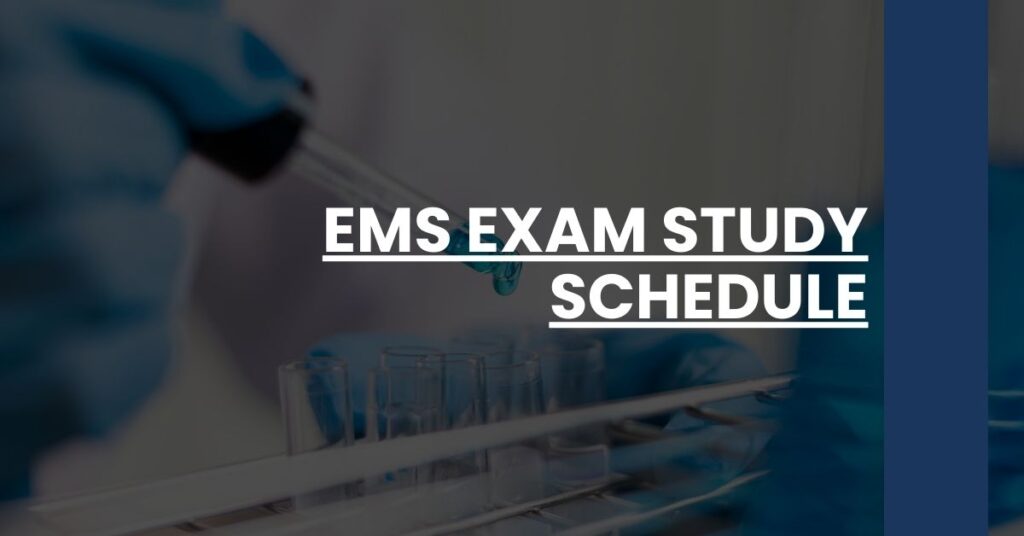Crafting an effective EMS exam study schedule is pivotal for your success.
- Personalized Planning: Tailor an EMS study schedule that fits your lifestyle and optimizes learning.
- Time Management Mastery: Learn to allocate your study time efficiently for EMS exam success.
- Consistent Study Habits: Build and maintain consistent study routines for your EMS exam preparation.
Ace your EMS exam with the right study schedule.
- Understanding the Components of Your EMS Exam
- Assessing Your Starting Point
- Setting Realistic Study Goals
- Crafting Your Custom Study Plan
- Allocating Time Effectively
- Study Techniques for EMS Exam Success
- Consistency Over Intensity
- Balancing Study with Practice
- Leveraging Quality Study Materials
- Staying Motivated and Dealing with Burnout
- Review and Adjust Your Study Schedule
- Final Week: The Home Stretch
- Conclusion: Ready for Success
Understanding the Components of Your EMS Exam
Before diving into your EMS exam study schedule, it’s crucial to have a comprehensive understanding of what you are studying for. The EMS exam covers several key areas, each demanding a strategic approach for preparation. Your success hinges on recognizing these content areas and allocating your study time accordingly.
Breaking Down the Test Components
The EMS exam is designed to evaluate your knowledge and skills across a range of emergency medical scenarios. Here’s what you need to include in your study plan:
- Airway/Ventilation: Proficiency in assessing and managing a patient’s airway is essential, as it’s a critical component of emergency care.
- Cardiology: Given its high weightage in the exam, a thorough understanding of cardiac emergencies and care is crucial.
- Trauma: This encompasses the broad spectrum of physical injuries that could occur and requires prompt attention.
- Medical: This category includes medical emergencies that are non-traumatic, like diabetic emergencies or strokes.
- EMS Operations: This area deals with the operational aspect of EMS, including transport, communication, and safety.
By structuring your study plan around these topics, you can ensure that no area is neglected and that you’re building a solid foundation of knowledge.
Assessing Your Starting Point
Creating a study schedule that works for you begins with a realistic assessment of your current knowledge base. Identifying areas where you’re strong and those where you need further study will allow you to tailor your study schedule for the best outcomes.
Gauging Your Strengths and Weaknesses
Consider starting with self-assessment tools like “The Aeromedical Certification Examinations Self-Assessment Test” available on platforms like Amazon. These types of tests can highlight your strong points and vulnerabilities, allowing you to create a study schedule that addresses your specific needs.
Setting Realistic Study Goals
You need realistic goals to stay on track. Goals put your aspirations into perspective, transforming the daunting task of passing the EMS exam into a series of achievable milestones.
Goals That Work for You
When setting your study goals, consider the following:
- Think about your daily routine and be honest about how much time you can dedicate to studying each day.
- Set specific milestones for each week, such as mastering a set of protocols or understanding a particular set of conditions.
Clear, targeted goals will make your EMS exam study schedule feel less overwhelming and more achievable.
Crafting Your Custom Study Plan
The most effective EMS exam study schedule is one that’s customized to your needs. Consider your lifestyle, learning pace, and knowledge gaps when creating your study plan.
Individualizing Your Approach
Here’s a step-by-step process to tailor a study plan:
- Examine your weekly schedule: Allocate specific time blocks for studying, ensuring you’re not sacrificing essential activities like sleep and exercise.
- Balance between topics: Differentiate study sessions to cover all exam components adequately.
- Incorporate diverse study methods: This could include flashcards for medical terminology and practice exams for scenario-based questions.
Adapting your study plan to include a variety of activities can help keep you engaged and make studying less monotonous.
Allocating Time Effectively
Once you know what to study, the next step is figuring out when and for how long. The organization is the ally of preparedness, ensuring that you cover all the necessary material without burning out.
Planning Your Sessions
- Prioritize difficult areas: Allocate more time to topics where you need the most improvement.
- Scheduled breaks: It’s essential to avoid burnout by periodically stepping away to recharge.
- Varied session lengths: Some topics may require longer, uninterrupted study sessions, while others can be addressed in shorter, more frequent reviews.
Managing your study time will help you move through your EMS exam study schedule without feeling overwhelmed.
Study Techniques for EMS Exam Success
Incorporating different study methods can not only make your EMS exam study schedule more dynamic but also improve retention and understanding.
Leveraging Effective Study Methods
Consider including these techniques:
- Active recall: This involves testing yourself on the material you’ve studied to enhance memory retention.
- Spaced repetition: Revisit material over increasing intervals of time to reinforce learning.
- Visualization: Use diagrams and flowcharts to understand complex information better.
Incorporating tools like study apps can provide valuable support in your preparation. It’s all about finding the methods that resonate with you and incorporating them into your EMS exam study schedule.
Consistency Over Intensity
In your journey toward acing the EMS exam, consistency should be your guiding principle. It’s about what you do every day, not what you do once in a while. By integrating steady and regular study habits into your EMS exam study schedule, you’ll be better prepared and less likely to succumb to the stress of last-minute cramming.
Creating Habit Loops
- Routine establishment: Set a specific time and place for study, making it a non-negotiable part of your day.
- Incremental learning: Consistently chip away at the material. This helps build knowledge over time rather than overwhelming yourself with too much information at once.
- Accountability systems: Whether it’s a study group or an app that tracks your progress, find ways to hold yourself accountable.
Remember, consistency also means being adaptable. As you move through your study schedule, you may need to adjust your methods or allocate more time to areas where you’re struggling. Paying attention to these shifts and evolving your EMS exam study schedule accordingly is key to consistent improvement.
Balancing Study with Practice
The balance between theoretical study and practical application is a tightrope that all EMS candidates must walk. A good blend of both is necessary, as practical skills are just as critical as knowledge when it comes to emergency medical services.
Bridging Theory with Practice
- Scenario-based learning: Regularly engage in mock scenarios to apply what you’ve read and memorized.
- Practical repetitions: Skills like CPR require muscle memory, which only develops through repetitive practice.
- Discussion and reflection: After practical sessions, take time to discuss and reflect, cementing the experience in your memory.
Quality resources such as practice exams and adaptive tutoring systems are incredibly valuable for integrating knowledge with hands-on experience. They not only solidify your grasp of the concepts but also prepare you for the unpredictability of real-life emergency situations.
Leveraging Quality Study Materials
The quality of the materials you use to study for your EMS exam can make a significant difference in your level of preparedness. Diversified resources support different learning styles and help reinforce knowledge retention through varied modes of engagement.
Choosing Your Arsenal of Study Aids
- Recommended textbooks: These are foundational to any study schedule and provide an in-depth understanding of medical processes and emergency practices.
- Interactive apps: Flashcards and quiz apps can make studying more active and engaging.
- Online courses: Supplement your textbooks with video lectures and interactive modules that can reinforce learning.
Compiling a variety of study materials such as practice exams, flashcards, and quick guides will offer a comprehensive approach to your studies. These tools can bridge gaps in understanding and give you the confidence needed to excel.
Staying Motivated and Dealing with Burnout
The road to passing your EMS exam can be long and challenging. Keeping your motivation high is critical for pushing through the tough times. Recognizing and addressing burnout early can make the difference between persevering and getting sidetracked.
Keeping the Fire Alive
- Set achievable micro-goals: Smaller, attainable goals can give you a regular sense of achievement.
- Celebrate small wins: Rewarding yourself when you hit milestones can reinforce positive study habits.
- Social support: Having a network to share your challenges and successes with can provide emotional support and motivation.
Strategies like establishing a structured study schedule and practicing self-care are vital for managing stress; these are well-documented in research addressing the prevention of burnout.
Review and Adjust Your Study Schedule
A good EMS exam study schedule isn’t just set at the beginning and followed blindly. It requires regular assessment and tweaks to address changes in learning pace, difficulty of material, or other life circumstances.
Making Informed Adjustments
- Continuous assessment: Regularly evaluate the effectiveness of your study schedule and be prepared to make changes if necessary.
- Feedback incorporation: After practice exams or study sessions, reflect on what areas need more attention and adjust your study plan.
- Flexibility: Life can be unpredictable, so be sure to build some flexibility into your study schedule to accommodate those unforeseen events.
When making adjustments, remember that your ultimate goal is to cover all necessary material without burnout. Regular review of your study schedule ensures that you’re not just following a plan but actively engaging with your study process to make it as effective as possible.
Final Week: The Home Stretch
The week before the EMS exam can be stressful, yet it is a crucial time for consolidating your knowledge and ensuring you’re mentally and physically ready for the big day. The home stretch should be about fine-tuning your understanding, not trying to learn new concepts.
Strategies for the Final Countdown
- Comprehensive review: Revisit your notes and summaries, focusing on the essential points.
- Relaxation techniques: Engage in activities that reduce stress, like light exercise, meditation, or listening to music.
- Sleep hygiene: Ensure you’re well-rested and alert for the exam by getting a good night’s sleep in the lead-up.
Resist the urge to cram, as this can overwhelm your brain and actually diminish your performance. Instead, use this time to build confidence in what you have learned, focusing on a well-rounded review.
Conclusion: Ready for Success
By now, you understand that creating a successful EMS exam study schedule is about more than just marking dates on a calendar. It requires self-awareness, organization, commitment, balance, and flexibility.
As you embark on your preparations, remember that this is a marathon, not a sprint. The effort you put into devising a personalized, adaptable, and sustainable study schedule will pay off on exam day.
Stay motivated, stay consistent, and remember that with every study session, you’re one step closer to the goal. Your determination and smart planning are your tickets to success. Now, seize the day and make your EMS exam study schedule work for you!
EMS exam study schedule strategies for top results—optimize your preparation with our expert guide on efficient study planning.

